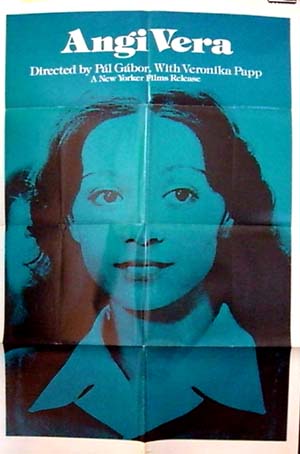
ANGI VERA
Hungary, 1980, 92 minutes, Colour.
Veronika Papp, Erszi Paszior, Eve Szabo.
Directed by Pal Gabor.
is a Hungarian film set in 1948 in which an uneducated young girl, an assistant in a hospital, has an opportunity for further training but within the context of the indoctrination by the Communist Party. The film shows her moving through this training, challenged by falling in love with a married man, denouncing herself and then going forward with applause to further training and life within Hungary during the Stalinist regime. The film's strengths are in the performances, especially that by Veronika Papp as Vera. She has an intense presence which draws the attention of the audience and makes it feel with her. The other strength is the critique of the period and the indoctrination and subjugation of human feelings. There is an attention to detail, especially on the characters during the period of training. The film had overseas release, especially in the United States where it was very well reviewed.
1. The impact of the film? Human document? Portrait of Hungarians, illustration of communist life in the late 1940s? A critique of post-war communism?
2. The quality of filmmaking: the work of the Hungarian industry, colour photography, re-creation of the period, atmosphere? Editing? Focus on persons? Close-ups, groups? Musical score?
3. Audience presuppositions about communism? Communist takeovers in Eastern Europe? The aftermath of World War Two? The cold war and the late '40s? The stressing of ideologies in the late '40s? The attack on the cult of the personal and the individual? Idealism and social conscience? Standards for good communists? The intensity of training? The optimistic hopes for the change in government? Transition from the resistance during the war to ideological training for communism? The mellowing of attitudes after the revolution of the '50s and the detente of the '60s and '70s?
4. The hospital and the training programme as a microcosm of Hungary? Traditional methods. the wealthy still in charge and needing to be eradicated? Troubles and poor methods? The work of Catholics and religious in the hospitals? The critique of the administration? The changeover to communist regimes?
5. Angi Vera as symbolic of Hungary after the war? Her war experience, the loss of her parents, being brought up as an orphan, her need for belonging, having lost her parents? Hungary needing communism after World War Two? Her shyness, youthfulness? Her willingness to learn? The impact of the training experience? The influence of the trainers, of the women on the course? Eagerness, loyalty, love? Her emotional attachment to the supervisor? Her having to make decisions for herself? Her renunciation of emotional involvement? Her success in the course, her future career? Her dehumanisation?
6. The portrait of Vera in herself? Young girl, naive, her spontaneous outburst, her being used by the authorities? Her learning to live with the women, sharing their attitudes, their stories, preoccupation with sex, giggling? The shower sequence and the feminine impact? The study group? Her infatuation with Andre? Her enjoyment of the course, recreations, the parties? Her coaching the miner? The contrast of influence of Maria and Anna? Her going with Anna on the inquiries about loyalty, visiting apartments? The crisis with Andre and her cutting him off? Her reforming? The ending and success?
7. The portrait of Maria as independent, alive, freethinking, passionate, helping Vera? Her being the centre of attention? Her failure in the course? Vera's passing her in the car? The contrast with Anna and her work on the papers, in the war and the Resistance, the hostility of the other women? The emotional telling of her love story? Seeing her at work in the course, visiting the apartments to get information and report subversives? Her enjoyment of the cakes at the cafe? Her severity and yet her kindliness towards Vera? Trying to save her at the end?
8. The sketches of the other women on the course? Seeing them in the dormitories, listening to their talk, the shower sequence, the meals, the party? The dancing? Their hopes from the course? Their attendance at the review session and their humiliation by the supervisors?
9. Andre and his work with the groups, Vera's attachment to him? Her dancing with him? His inviting her to spend the night, her going - fear that Anna would see her? His being married? His relationship with his wife and children? Vera's breaking off the liaison? His disappearing? The replacement sequence?
10. Josef and his being tutored by Vera? His advances towards her?
11. The impact of the session of review ? the humiliating methods, the alleged morale-boosting? The rigour of communism and its idealistic ideology of the time?
12. The portrait of Hungary in the late '40s? The serious taking of communism at the time? Seen in retrospect? Individuals as pawns for society? Faith in the communist state?